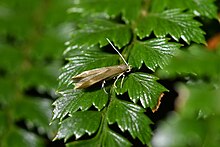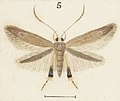| Thylacosceles acridomima | |
|---|---|

| |
| Thylacosceles acridomima seen in Fiordland National Park | |
|
Scientific classification
| |
| Domain: | Eukaryota |
| Kingdom: | Animalia |
| Phylum: | Arthropoda |
| Class: | Insecta |
| Order: | Lepidoptera |
| Family: | Stathmopodidae |
| Genus: | Thylacosceles |
| Species: | T. acridomima
|
| Binomial name | |
| Thylacosceles acridomima | |
Thylacosceles acridomima, also known as the pūniu spore-eater or the micro-featherfoot, [2] is a moth of the family Stathmopodidae. [3] [1] This species is endemic to New Zealand. [1] It was first described by Edward Meyrick in 1889. [4] [5]
The mature larva of this species is between 5 and 6 mm long and is short and fat with a whitish flesh coloured body and pale brown head. [2]
Meyrick described the adult male of this species as follows:
♂. 11mm. Head and palpi light yellowish-ochreous. Antennae whitish-fuscous, base yellowish. Thorax fuscous. Abdomen grey. Anterior legs dark fuscous ; middle legs ochreous-yellowish ; posterior legs ochreous- whitish, tibiae with a black apical ring, and tuft of posterior half dark grey. Forewings elongate, very narrow, broadest near base, long-pointed ; fuscous, somewhat unevenly shaded, but without markings : cilia light fuscous. Hindwings fuscous-grey ; cilia light fuscous. [5]
The larvae of this species create a silk tunnel on the underside of fronds of their host species. [2] The adults of this species are on the wing from October to January. [2]
The larval host of this species is Polystichum vestitum. The larvae feed on the spores of this plant. [2]
-
Illustration of a female
-
Illustration of a male
-
Larvae of the species
- ^ a b c "Thylacosceles acridomima Meyrick, 1889". www.nzor.org.nz. Retrieved 2022-05-02.
- ^ a b c d e Andrew Crowe (2004). Life-Size Guide to New Zealand Native Ferns: Featuring the unique caterpillars which feed on them. p. 22. ISBN 0-14-301924-4. Wikidata Q115211440.
- ^ Gordon, Dennis P., ed. (2010). New Zealand inventory of biodiversity: Kingdom animalia: chaetognatha, ecdysozoa, ichnofossils. Vol. 2. p. 463. ISBN 978-1-877257-93-3. OCLC 973607714. OL 25288394M. Wikidata Q45922947.
- ^ John Stewart Dugdale (23 September 1988). "Lepidoptera - annotated catalogue, and keys to family-group taxa". Fauna of New Zealand. 14. Department of Scientific and Industrial Research: 109. doi: 10.7931/J2/FNZ.14. ISSN 0111-5383. Wikidata Q45083134.
- ^ a b Edward Meyrick (May 1889). "Descriptions of New Zealand Micro-Lepidoptera". Transactions and Proceedings of the New Zealand Institute. 21: 171. ISSN 1176-6158. Wikidata Q56065895.
| Thylacosceles acridomima | |
|---|---|

| |
| Thylacosceles acridomima seen in Fiordland National Park | |
|
Scientific classification
| |
| Domain: | Eukaryota |
| Kingdom: | Animalia |
| Phylum: | Arthropoda |
| Class: | Insecta |
| Order: | Lepidoptera |
| Family: | Stathmopodidae |
| Genus: | Thylacosceles |
| Species: | T. acridomima
|
| Binomial name | |
| Thylacosceles acridomima | |
Thylacosceles acridomima, also known as the pūniu spore-eater or the micro-featherfoot, [2] is a moth of the family Stathmopodidae. [3] [1] This species is endemic to New Zealand. [1] It was first described by Edward Meyrick in 1889. [4] [5]
The mature larva of this species is between 5 and 6 mm long and is short and fat with a whitish flesh coloured body and pale brown head. [2]
Meyrick described the adult male of this species as follows:
♂. 11mm. Head and palpi light yellowish-ochreous. Antennae whitish-fuscous, base yellowish. Thorax fuscous. Abdomen grey. Anterior legs dark fuscous ; middle legs ochreous-yellowish ; posterior legs ochreous- whitish, tibiae with a black apical ring, and tuft of posterior half dark grey. Forewings elongate, very narrow, broadest near base, long-pointed ; fuscous, somewhat unevenly shaded, but without markings : cilia light fuscous. Hindwings fuscous-grey ; cilia light fuscous. [5]
The larvae of this species create a silk tunnel on the underside of fronds of their host species. [2] The adults of this species are on the wing from October to January. [2]
The larval host of this species is Polystichum vestitum. The larvae feed on the spores of this plant. [2]
-
Illustration of a female
-
Illustration of a male
-
Larvae of the species
- ^ a b c "Thylacosceles acridomima Meyrick, 1889". www.nzor.org.nz. Retrieved 2022-05-02.
- ^ a b c d e Andrew Crowe (2004). Life-Size Guide to New Zealand Native Ferns: Featuring the unique caterpillars which feed on them. p. 22. ISBN 0-14-301924-4. Wikidata Q115211440.
- ^ Gordon, Dennis P., ed. (2010). New Zealand inventory of biodiversity: Kingdom animalia: chaetognatha, ecdysozoa, ichnofossils. Vol. 2. p. 463. ISBN 978-1-877257-93-3. OCLC 973607714. OL 25288394M. Wikidata Q45922947.
- ^ John Stewart Dugdale (23 September 1988). "Lepidoptera - annotated catalogue, and keys to family-group taxa". Fauna of New Zealand. 14. Department of Scientific and Industrial Research: 109. doi: 10.7931/J2/FNZ.14. ISSN 0111-5383. Wikidata Q45083134.
- ^ a b Edward Meyrick (May 1889). "Descriptions of New Zealand Micro-Lepidoptera". Transactions and Proceedings of the New Zealand Institute. 21: 171. ISSN 1176-6158. Wikidata Q56065895.


